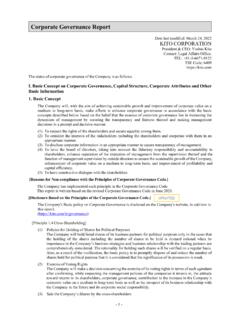Transcription of COMPENSATION MANAGEMENT - EIILM University
1 COMPENSATION Subject: COMPENSATION MANAGEMENT Credit: 4 SYLLABUS Objectives of COMPENSATION Introduction to COMPENSATION and Rewards; Objective of COMPENSATION and Rewards; Introduction to Framework of COMPENSATION Policy; Labor market characteristics and pay relatives Wage Determination: Introduction to COMPENSATION , Rewards, Wage Levels and Wage Structures; Introduction to Wage Determination Process and Wage Administration rules; Introduction to Factors Influencing Wage and Salary Structure and Principles of Wage and Salaries Administration; Introduction to the Theory of Wages: Introduction to Minimum, Fair and Living Wage Wage Deferential Introduction to Minimum Wages; Introduction to Basic Kinds of Wage Plans; Introduction to Wage Differentials & Elements of a Good Wage Plans; Introduction to Institutional Mechanisms for Wage Determination Executive COMPENSATION Legalistic Framework for Wage Determination; Introduction to Importance of Wage Differentials; Introduction to Executive COMPENSATION and Components of Remuneration Job Evaluation Introduction to Nature and Objectives of Job Evaluation; Introduction to Principles and Procedure of Job Evaluation Programs; Introduction to Basic Job Evaluation Methods; Introduction to Implementation of Evaluated Job; Introduction to Determinants of Incentives; Introduction to Classification of Rewards; Incentive Payments and its Objectives.
2 Wage Incentives Introduction to Wage Incentives in India; Introduction to Types of Wage Incentive Plans; Introduction to Prevalent Systems & Guidelines for Effectives Incentive Plans; Introduction to Non- Monetary Incentives Profit Sharing Introduction to Cafeteria Style of COMPENSATION ; Introduction to Problems of Equity and Bonus; Profit Sharing & Stock Options; Introduction to Features of Fringe Benefits; Introduction to History and Growth Factors; Coverage of Benefits; Introduction to Employee Services & Fringe Benefits in India Benefit Programs Introduction to Benefit Programs; for MANAGEMENT & Administration of Benefits & Services; Introduction to COMPENSATION Survey & Methodology; Introduction to Planning COMPENSATION for Executives & knowledge Workers Tax Planning Introduction to Tax Planning; Comparative International COMPENSATION ; Introduction to Downsizing; Voluntary Retirement Scheme; Pay Restructuring in Mergers & Acquisition Suggested Readings: 1.
3 Human Resource MANAGEMENT , by Prasad, Sultan Chand & Sons. 2. Personal & Human Resource MANAGEMENT , by P. Subba Rao, Himalaya Publishing House. 3. Human Resource MANAGEMENT , by K. Aswathappa, Tata McGraw Hill Publishing Company Ltd. 4. Bhawdeep singh & Prem Kumar- Current Trends in HRD: Challenges & Strategies in a changing scenario. iCOMPENSATION MANAGEMENTA ccurate and updated information is the primary need of anymanagement practice. Study offers one such means of gatheringrealistic information. A detail Study of such information and itsaccuracy presents the usefulness of the information. The studyof COMPENSATION MANAGEMENT is one of the basic facet ofHuman huresource aim of this subject is to develop students understandingof the concepts of COMPENSATION and rewards in the organiza-tion . In particular the subject is designed to develop theunderpinning knowledge and skills required to understand theone of the complex MANAGEMENT functions compensatingemployees and its importance.
4 This subject introduces thestudent to the basics COMPENSATION structure and familiarizes the students with the practice of various manage-ment techniques and it s expected results like job evaluation learner is apprised about the latest issues in managementrelated to COMPENSATION in order to make the students abreastabout the recent trends in the MANAGEMENT (BBA)COURSE OVERVIEWThe students on completion of the course shall develop thefollowing skills and know the nature and scope of about essential elements of about the COMPENSATION structure of job the importance of fringe benefitsAwareness of the latest trends in compensationivCOMPENSATION No. Concepts and IssuesLesson 1 Role of COMPENSATION and Rewards in the Organization1 Lesson 2 Objectives of COMPENSATION and Rewards5 Lesson 3 Frame work of COMPENSATION policy9 Lesson 4 Labor Market Characteristics13 Essential ElementsLesson 5 COMPENSATION Structure and Differentials16 Lesson 6 Wage Determination process19 Lesson 7 Wage and Salary structure25 Lesson 8 Introduction To The Theory of wages34 Lesson 9 Introduction To Minimum.
5 Fair And Living Wage37 Lesson 10 Introduction To The Minimum Wage40 Lesson 11 Introduction To Basic kinds of Wage Plans43 Lesson 12 Introduction to Wage Differentials & Elements ofa Good Wage Plan46 Lesson 13 Institutional mechanism for wage determination50 Lesson 14 Wage fixation56 Lesson 15 Introduction To Nature and Objectives of Job Evaluation61 Lesson 16 Nature and Objectives of Job Evaluation66 Lesson 17 Principles and Procedure of job evaluation program67 Lesson 18 Exercise on Job Evaluation70 Lesson 19 Introduction to Basic Job Evaluation Methods/Systems& Packaged Point Plans76 Lesson 20 Job Evaluation Methods81 Lesson 21success of job evaluation86 CONTENTCOMPENSATION MANAGEMENTvCOMPENSATION MANAGEMENT Principles of External an Internal DifferentialsLesson 22 Objectives, Role, Importance of Rewards And Incentives91 Lesson 23 Importance Of Rewards And Incentives95 Lesson 24 Classification of Rewards and Incentives98 Lesson 25 Guidelines for effective incentive plans103 Lesson 26 Non-Monetary Incentives108 Lesson 27 Cafetaria style of compensation114 Lesson 28 COMPENSATION Policy118 Lesson 29 Fringe Benefits122 Lesson 30 Fringe Benefits124 Lesson 31 Concept of employee services And Fringe Benefits in India128 Lesson 32 Administration of Benefit programme and services133 Lesson 33 Concepts of COMPENSATION Survey136 Lesson 34 Planning COMPENSATION for Executives And Knowledge Workers141 Lesson 35 Concept of Superconductivity.
6 SQUID s and its applications120 Latest Trends in COMPENSATION ManagementLesson 36 Planning COMPENSATION for Managerial and Professional Jobs147 Lesson37 Introduction To Downsizing151 Lesson 38 Voluntary Retirement Scheme158 Lesson 39 Pay Restructuring in Mergers and Acquisitions164 Lesson 40 Case Study169 Lesson 41 Towards understanding Industry and Labour in the post-MFAR egime: Case of the Indian Garment Industry-M. Vijayabaskar172 CONTENTCOMPENSATION MANAGEMENT1 COMPENSATION MANAGEMENTL earning Objectives Understand the meaning of COMPENSATION Know the role of COMPENSATION MANAGEMENT Importance and purpose of COMPENSATION MANAGEMENT inorganizationsIf the abilities of employees have been developed to the pointwhere they meet or exceed job requirements, it is nowappropriate that they be equitably compensated for theircontributions.
7 The factors affecting the determination ofequitable COMPENSATION are many, varied and complex. Andmanagement must come to some decision concerning the basicwage or salary. To motivate improved performance on the jobmany systems of variable COMPENSATION have been devised andfinally organizations have developed numerous ways ofproviding supplementary COMPENSATION in the form of Students Lets Try to Define Exactly WhatCompensation Is? COMPENSATION is a systematic approach to providing monetaryvalue to employees in exchange for work may achieve several purposes assisting inrecruitment, job performance, and job lets Discuss how is COMPENSATION used? COMPENSATION is a tool used by MANAGEMENT for a variety ofpurposes to further the existence of the may be adjusted according the business needs,goals, and available may be used to Recruit and retain qualified employees. Increase or maintain morale/satisfaction.
8 Reward and encourage peak performance. Achieve internal and external equity. Reduce turnover and encourage company loyalty. Modify (through negotiations) practices of and retention of qualified employees is a commongoal shared by many employers. To some extent, the availabilityand cost of qualified applicants for open positions isdetermined by market factors beyond the control of theemployer. While an employer may set COMPENSATION levels fornew hires and advertise those salary ranges, it does so in thecontext of other employers seeking to hire from the sameapplicant and job satisfaction are affected by COMPENSATION . Oftenthere is a balance (equity) that must be reached between themonetary value the employer is willing to pay and thesentiments of worth felt be the employee. In an attempt tosave money, employers may opt to freeze salaries or salary levelsat the expense of satisfaction and morale. Conversely, anemployer wishing to reduce employee turnover may seek toincrease salaries and salary may also be used as a reward for exceptional jobperformance.
9 Examples of such plans include: bonuses,commissions, stock, profit sharing, gain COMPENSATION refers to all forms of pay or rewardsgoing to employees and arising from their employment, and ithas two main components. There are direct financial paymentsin the form of wages, salaries, incentives, commissions andbonuses and there are indirect payments in the form of financialbenefits like employee paid insurance and in nutshell we can say that employee COMPENSATION refers toall the forms of pay or rewards going to employees and arisingfrom their employmentCompensation includes direct cash payments, indirect paymentsin the form of employee benefits & incentives to motivateemployees to strive for higher leveis of productivity is a criticalcomponent of employment is affected by many factors like labour marketfactors, collective bargaining, government legislation & topmanagement philosophy regarding pay is COMPENSATION MANAGEMENT ?
10 Process of COMPENSATION MANAGEMENT is to establish &maintain an equitable wage & salary structure & an equitable coststructure .it involves job evaluation, wage & salary survey, profitsharing &control of pay important functions of COMPENSATION Equity function Motivation functionEquity is based on past & current performance& motivationwith which the work has been performed in the past & and Purpose of COMPENSATION managementThe basic purpose of COMPENSATION MANAGEMENT is toestablish and maintain an equitable reward system. The otheraim is the establishment and maintenance of an equitablecompensation structure, i. e, an optimal balancing of conflictingpersonnel interests so that the satisfaction of employees andemployers is maximized and conflicts minimized. Thecompensation MANAGEMENT is concerned with the financialaspects of needs, motivation and rewards. Managers, therefore,analyze and interpret the needs of their employees so thatreward can be individually designed to satisfy these needs.


![History of China and Japan 184-1949 [Rai Foundation]](/cache/preview/a/3/3/5/6/9/1/4/thumb-a335691420aa300e037ceb6914287831.jpg)




